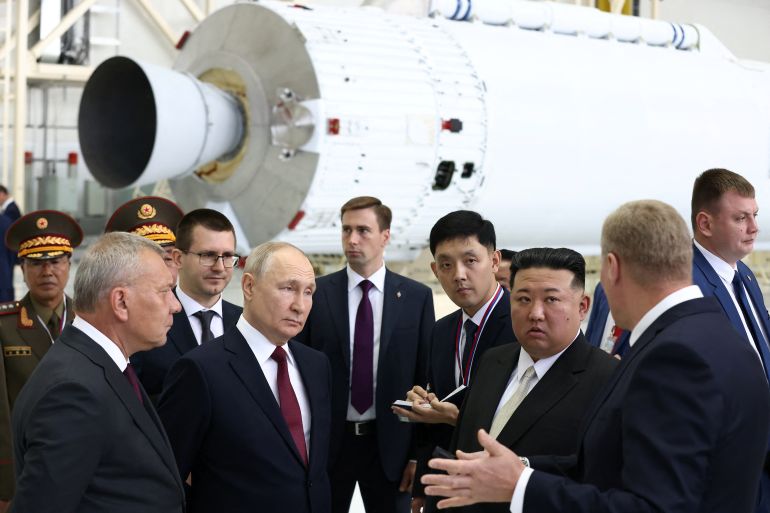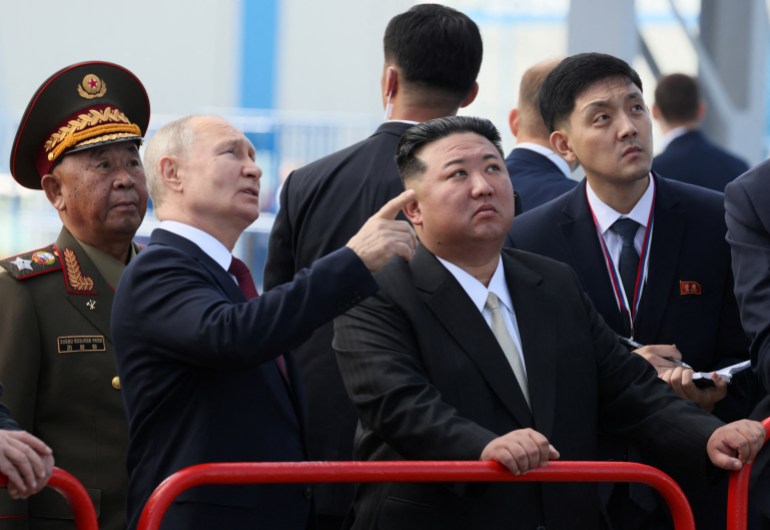Kim Jong Un and Putin meet hours after North Korea missile launch
Leader Kim Jong Un is in Russia for talks with President Vladimir Putin that are expected to focus on arms sales.

North Korean leader Kim Jong Un has begun his summit with Russian President Vladimir Putin at the Vostochny Cosmodrome, a couple of hours after Pyongyang fired two short-range ballistic missiles off its east coast.
Russia’s state news agency RIA Novosti said Kim arrived at the cosmodrome in Russia’s eastern Amur region on Wednesday morning, minutes after Putin.
Keep reading
list of 4 itemsKim Jong Un’s ‘Moving Fortress’ North Korea train: What to know
‘A new and terrifying world’: Kim and Putin to meet again in Russia
US threatens sanctions if North Korea sells arms to Russia
The two men shook hands as they met, according to video from the Kremlin.
Putin told Kim he was “very glad to see” him, while Kim thanked Putin for the invitation to visit Russia, “despite being busy”, Russian state media said.
The Kim-Putin talks are expected to cover potential weapons sales, with the North Korean leader accompanied by top officials from the military and the weapons’ industry.
As Putin showed Kim around the cosmodrome, he told reporters from state media that “all issues” were up for discussion, and that Russia would help North Korea build satellites.
The summit offers a chance for Putin to secure much needed weapons for Russia’s war in Ukraine and Kim is expected to press for economic aid and military technology in return.
Not long before the meeting began, South Korea and Japan said they detected the launch of two short-range ballistic missiles from the east coast of North Korea.
South Korea’s Joint Chiefs of Staff said it detected the launches from an area in or around Sunan, just north of Pyongyang between about 11.43am (02:43 GMT) and 11.53am (02:53 GMT) and that it was analysing the data.
“Our military has strengthened surveillance and vigilance in preparation for further launches, while maintaining full readiness by closely cooperating with the US,” the JCS said in a statement.
Japan’s Chief Cabinet Secretary Hirokazu Matsuno told reporters that Japan had lodged a protest against North Korea through diplomatic channels in Beijing.
The two missiles fell in the sea outside Japan’s exclusive economic zone (EEZ), he added.
“Fascinating: a launch without Kim Jong (Un) in the country. A first,” US-based security analyst Ankit Panda wrote on X, the platform previously known as Twitter.
Weapons’ development
North Korea has carried out numerous missile tests this year in breach of United Nations’ sanctions that were imposed over its nuclear missiles programme in 2017, as it moves ahead with ambitious plans to modernise its military.
There have been more than 100 missile launches since the start of last year.
Pyongyang fired two short-range ballistic missiles at the end of August, in what it said was a simulation of a tactical nuclear strike on South Korea.
Last week, Kim officiated at the launch ceremony for the country’s first ‘tactical nuclear attack‘ submarine, the Hero Kim Kun Ok. North Korea has also been trying to put a military spy satellite into orbit, but its two efforts this year have both ended in failure.
At the talks with Putin, Kim was effusive, saying Pyongyang had “not forgotten” Russia’s longstanding friendship and goodwill.
“Russia is currently undertaking a righteous endeavour to protect its sovereign rights and security interests against hegemonic forces,” Kim was quoted as saying in apparent reference to the war in Ukraine. “We have consistently expressed our full, unconditional support for all measures taken by the Russian government. Taking this opportunity, we affirm that we will always stand with Russia in the anti-imperialist, self-reliant front.”

How Kim maintains command and control over his country’s missile and nuclear forces while abroad is unclear, but analysts say recent drills have revealed a system for overseeing nuclear weapons similar to those used in the United States and Russia.
A report in March by the 38 North programme, which tracks North Korea, said state media announcements outlined a process that includes commanders of units and various sub-units, a launch approval system, and “technical and mechanical devices” governing nuclear weapons control.